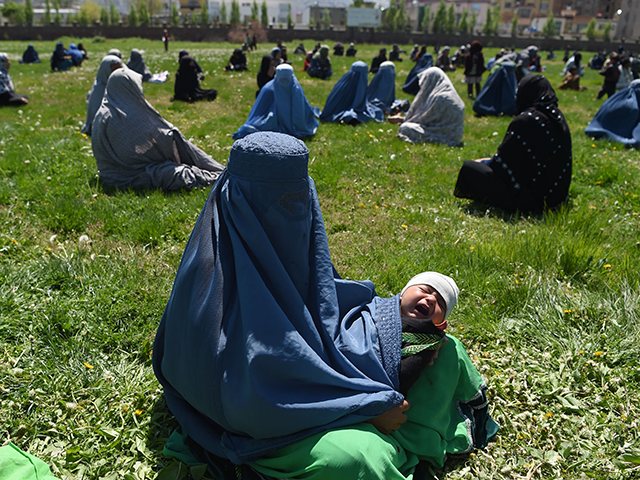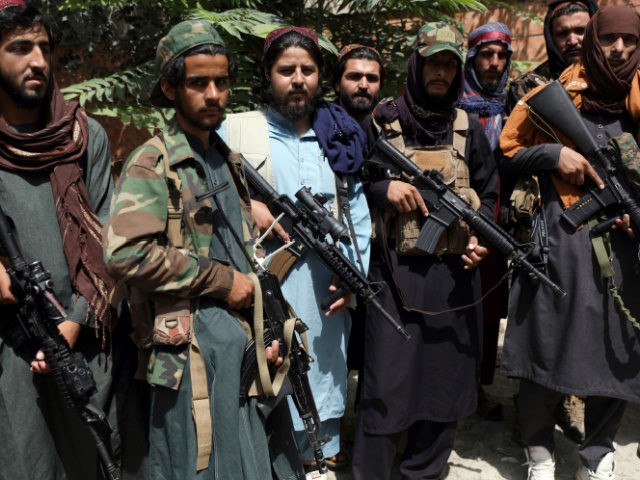The U.S. Treasury Department reportedly gave humanitarian organizations its approval to provide aid for Afghanistan this week, despite sanctions against the Taliban that would make many of the needed financial transactions technically illegal.
Treasury officials gave the “green light” to humanitarian groups in “private conversations this week,” after they asked for assurances they would not be punished under sanctions against the Taliban, the Wall Street Journal (WSJ) reported Thursday. Two groups were named in the report: InterAction and Alliance for Peacebuilding.
“It is unclear whether the informal guidance has fully addressed their concerns, as prominent coalitions of aid groups have asked the Treasury Department to issue formal waivers,” the WSJ noted.
The International Monetary Fund (IMF) and World Bank suspended their aid programs for Afghanistan this week, citing concerns about the security situation and the illegitimate nature of the Taliban government.
Elizabeth Hume, acting chief executive of Alliance for Peacebuilding, said it would be “incredibly difficult” for humanitarian groups to avoid violating sanctions laws by interacting with the Taliban and entities it controls, including Afghanistan’s banking system. Other humanitarian analysts pointed out that accessing the huge number of hungry, sick, and internally displaced persons in Afghanistan to deliver humanitarian assistance will require cooperation with Taliban officials.
The International Organization for Migrants (IOM) estimated there were 5.5 million displaced persons within Afghanistan before the Taliban reached Kabul. IOM said almost half of the Afghan population needed some form of emergency assistance.
Priorities in Afghanistan include:
☑️ Emergency shelters
☑️ Water
☑️ Health
☑️ ProtectionThere are some 5.5 million internally displaced persons in the country, including more than 550,000 newly displaced in 2021: https://t.co/nFggjinkm2 pic.twitter.com/adJgiw9gpv
— IOM – UN Migration 🇺🇳 (@UNmigration) August 26, 2021
The World Food Program (WFP) warned on Wednesday that Afghanistan faces a massive food crisis as winter approaches.
The WFP explained that it normally uses the late summer months to stockpile food in communities across the country so it can be distributed during the winter, but those operations have been disrupted by the Taliban takeover.
“With funding levels tight and needs escalating, we risk running out of our core supply – wheat flour – come October. We only have a few short weeks left to secure the necessary donor funding to get food in place before the mountain passes are blocked by snow. Any further delay in our preparations could be deadly for the people of Afghanistan,” said WFP deputy regional director Anthea Webb.

A woman wearing a burqa holds her child as she waits to receive free wheat from the government emergency committee during a government-imposed lockdown on the capital city as a preventive measure against the COVID-19 coronavirus, in Kabul on April 21, 2020. (Photo by WAKIL KOHSAR / AFP) (Photo by WAKIL KOHSAR/AFP via Getty Images)
Webb said it was still possible to “prevent a hunger emergency despite the current challenges,” and said WFP was able to reach 80,000 people in need of assistance across Afghanistan even during the “past tumultuous week.”
Afghanistan’s healthcare system was overwhelmed by the Wuhan coronavirus even before the Taliban advance began. As the extremists rolled through city after city, coronavirus testing and vaccinations fell by 70 percent or more, supplies of the oxygen needed to treat severe Chinese coronavirus cases were cut off, and hospital operations were disrupted.
The World Health Organization (W.H.O.) estimated on Tuesday that less than five percent of Afghanistan’s population has been vaccinated, and virus testing declined by 77 percent over the past week. The United Nations said last month that only 700,000 of Afghanistan’s 40 million people have been tested for the coronavirus.
Despite these alarming estimates, Afghan evacuees were allowed to fly to the United States without being tested or vaccinated if they did not display visible symptoms. The Pentagon said on Monday the refugees would be tested after arriving in the United States.
The Red Cross said on Wednesday that it has concerns about the safety of its staff, especially female workers, but vowed to continue operations in Afghanistan.
“As a humanitarian worker, of course there’s a lot of concern and uncertainty. People who have worked in Afghanistan will be feeling for the staff and people there, but at the same time what gives me hope is the great resilience and experience in the movement in dealing with this,” said Red Cross head of humanitarian policy Maryann Horne.
Horne saluted female staffers for the Afghan Red Crescent as “the pillars of the movement” and said the organization is “in a position to manage issues such as the safety of staff because we know the country and have deep relationships.”

COMMENTS
Please let us know if you're having issues with commenting.